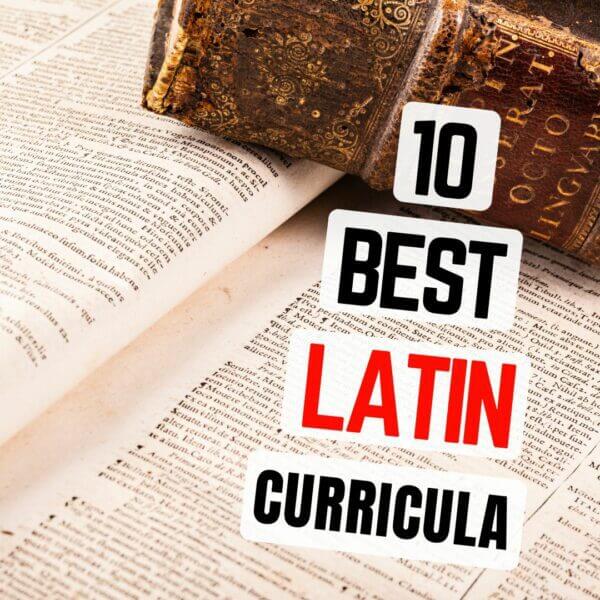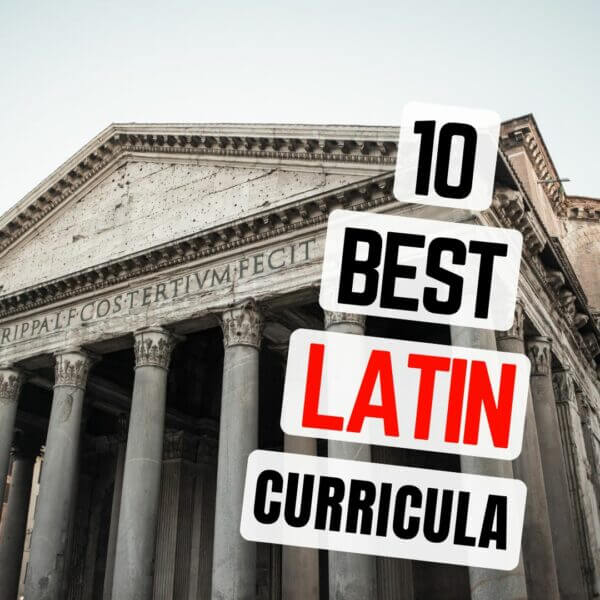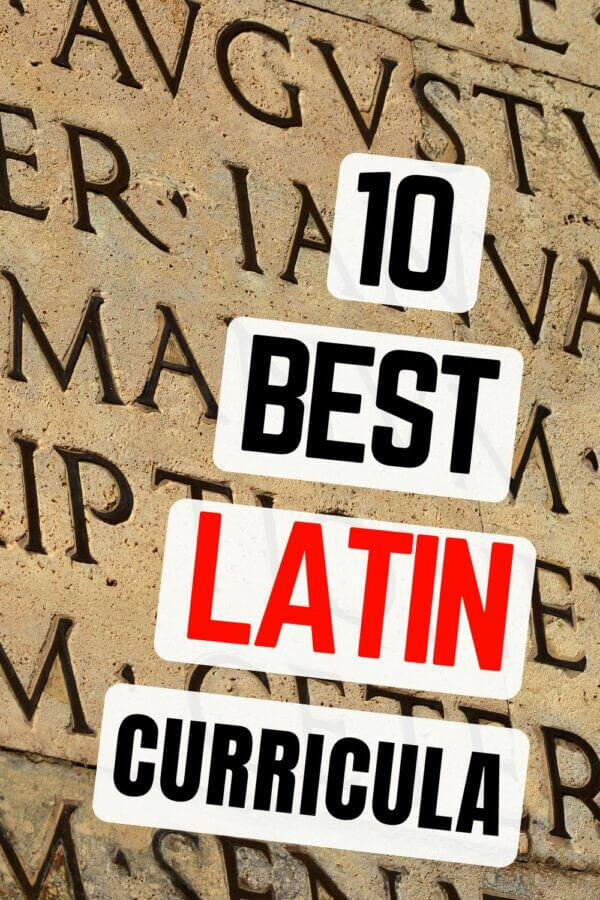Review by 10 Best Latin Curriculum programs

When it comes to homeschooling Latin, there are numerous options to choose from. Parents have the ability to find the best curriculum that fits their child’s learning style and interests, as well as the budget. This article will explore some of the best Latin homeschool curriculum options available and provide guidance on determining which one is right for your family.

Let’s look at these Latin homeschool curriculum programs in more detail below.

Affiliate links used in this article.
This makes the program a big hit with students!
If you get the online version, you’ll get online access and you can complete the worksheet portion as fun interactive quizzes on their online platform.
Each lesson has three parts: grammar, sentences, and reading /translation. This Latin homeschool curriculum is designed to be used by families without Latin experience.
Lessons can be completed independently by students making this a good option if you’re a parent who is working from home.
Visual Latin 1 and Visual Latin 2 contain 30 lessons each. The first volume of Visual Latin covers cases, mood, pronouns, nouns, active & passive verbs, the accusative case, declensions, and some more
Then Visual Latin 2 builds upon the foundation of the first volume and covers verb tenses, present participles, the perfect/pluperfect tense, adverbs, the subjunctive, and some more.
The recommended schedule is one lesson per week for the school calendar year. You can use this program for all of your children too, which is wonderful!

Memoria Press – Latina Christiana
Latina Christiana was designed as a beginning course for homeschooled students interested in learning Latin.
The program was specifically written for a parent or teacher with no background in Latin. Latina Christiana includes everything you need to start your Latin journey today!
Latina Christiana gets a lot of great reviews online and is commonly held to be one of the best Latin homeschool curriculum programs around today.
Once you complete Latin Christiana, Memoria Press offers First Form Latin. The homeschool Latin curriculum includes a student text, workbook, teacher’s guide, answer key, quizzes and tests, flashcards, and a DVD.
The course is also offered as an online class for families who would like more support.
First Form Latin can be used by older children new to Latin or by younger children who have completed Latin Christiana.
First, Second, Third, and Fourth Form Latin use a grammar first principle. This limits the amount of vocabulary a child is required to learn before mastering the necessary grammar for success.
The Memoria Press Latin series finishes with high school students studying Henle Latin and selections from Caesar’s Commentarri de Bello Gallico.
If you’re looking for one of the best Latin curriculum for homeschoolers, be sure to check out Memoria Press.
BJU Press Latin
BJU Press offers Latin 1 and Latin 2 courses as a boxed homeschool curriculum. That means this program is available and comes with teachers’ manuals to help parents teach the material. You (as the teacher/parent) don’t need any prior Latin experience to teach your children this program.
The teaching format allows a teacher who may not have any previous knowledge or experience in Latin to instruct the Latin course.
The educational materials also provide a summary of Roman history from the kingdom to the Republic and an overview of mythological Roman gods and goddesses in the light of God’s Word.
Schoolhouse Teachers
Schoolhouse Teachers have a primary Latin curriculum you get when you buy their homeschool curriculum. Children can start with Beginner Latin and then can progress to Latin II.
This curriculum provider also offers hundreds of electives (and multiple languages like Spanish and Korean) at the same subscription price for all children.
So they’re probably one of the most affordable Latin programs.
The video lessons give children an understanding of basic grammar and vocabulary while also allowing kids to see how Latin is still used in English today.
In addition, there are worksheets, charts, quizzes, and answer keys to help children master the information.
Latin in the Christian Trivium
Latin in the Christian Trivium is an offline workbook that comes to you in the mail.
The first textbook of Latin in the Christian Trivium includes 16 chapters that provide an introduction to the language of Latin, as well as the history of Italy, Rome, the Republic, and other aspects of Roman life.
This Latin curriculum uses the Bible as the primary source, providing information on the alphabet, pronunciation, declensions, moods, and other basic grammatical information.
To help children memorize and recall information, helpful charts, examples, and graphs are provided.
Exercises are completed in a student notebook. that is provided with the program.
With this program, Latin students will follow the story of a Roman centurion and his family. As they read, students learn new vocabulary in the context of this Roman family.
Classical Academic Press
If you’re looking for a good Latin program for kids, Classical Academic Press offers a few options.
Firstly, they have Latin for Children, which introduces young children to the Latin language. The program is designed for children between the fourth and the seventh grades.
The interactive approach will introduce children to vocabulary, grammar, and English derivatives.
Older children can try the Latin Alive series, which presents Latin through Roman culture and in other entertaining ways.
Latin Alive is designed for students in the seventh through twelfth grades. The Latin program teaches students not only Latin basics but also how to read and translate Latin texts.
A Gentle Feast
A Gentle Feast (a full Charlotte Mason homeschool curriculum) offers an engaging Latin curriculum that stands out as an excellent choice for homeschoolers seeking to introduce their students to the beauty and intricacies of the Latin language
The curriculum provides a well-rounded approach to Latin instruction, incorporating living books, interactive activities, and engaging exercises that cater to various learning styles.
Canon Press
The Canon Press Latin curriculum is helpful for classical homeschoolers who want to understand Latin and deepen their knowledge of the Latin roots of the English language. It’s also for students who want to read ancient Roman and Latin-language texts
Canon Press offers several Primers with accompanying flashcards.
The curriculum is designed for children in the third grade and higher.

Logos Latin
Logos Latin is a great way to connect with historical documents (like the Illiad and the Odyssey) and the foundation for modern ‘foreign languages’.
With weekly activities that include: coloring pages, story writing, word searches, crossword puzzles, anagrams, comic strips, and more.
Following three friends throughout the workbook, students will learn to conjugate verbs, translate and pronounce new vocabulary, and learn derivatives. 316 pages, softcover with glossary.
The course can be started by children in the second grade.
Oxford Latin
Oxford Latin is an excellent choice for older students or students in college. The Oxford Latin Course uses a reading-based approach as it offers students everything they need to know that is essential in a first-year Latin course.
The program focuses closely on the life of the Roman poet Horace. It also has cartoon images that appeal to older/college-aged students (as opposed to younger homeschooled students).
The course includes robust Latin grammar and a companion website that supplements the vocabulary and grammar learned in the Oxford Latin course.
Latin for Littlies
Latin for Littlies is a great Latin curriculum homeschool option for little kids. You can use it for small children aged K to Grade 2. This means you can start your Latin homeschool curriculum quite early
This program uses daily matching exercises, continuous review, and phonetic pronunciation in its 30 five-day lessons. This course gently encourages young students to study Latin for familiar words.
The Latin for Littlies workbook includes notes on how to use the book, original illustrations, optional coloring opportunities and English derivatives, and more.
It’s one of the best homeschool Latin curriculum options for young children.
Latin’s So Not Tough
Latin’s So Not Tough is a Latin homeschool curriculum that covers all grade levels. Young students in grades K-primary school can start with Level 1
Latin’s So Not Tough is a Latin homeschool curriculum that covers all grade levels. Young students in grades K-primary school can start with Level 1.
Older students can start at Level 2 or 3. The program has six levels in total.
A kit with the Latin’s So Not Tough curriculum includes a student workbook, answer keys, and a quizzes and exams booklet. They also include Latin flashcards on a ring.
A classical pronunciation key is also available for families who wish their children to learn how to pronounce Latin as well.
Combining Latin’s Not So Tough with their corresponding Hey Andrew, Teach Me Some Greek is an excellent way to add Greek and Latin roots homeschool curriculum to your child’s education.
Linney’s Latin Class
If you would like a free Latin homeschool curriculum, check out Linney’s Latin Class. The class is a free online class that uses the textbook The First Year of Latin
The textbook is available as a free PDF or it may be purchased from Amazon.
The class is appropriate for high school students. The first 33 lessons are approximately the equivalent of one year of high school Latin.
Why Learning a Latin Homeschool Curriculum Will Help You Learn Other Languages
Learning Latin may seem daunting, but it can help increase your chances of understanding other modern languages and broaden your horizons.
Latin has been the basis for many European languages since the Middle Ages and is still used in medicine, science, and law even today.
Because of its roots in so many cultures, mastering Latin will give you an advantage when learning other Romance languages like French, Spanish or Italian – all of which have their foundations in Latin.
Furthermore, by studying Latin grammar, you will become familiar with sentence structures common to most modern European languages like German or Dutch.
So Latin is such a valuable language to learn.
Learning a Latin Curriculum in the Grammar, Logic, and Rhetoric Stages of Classical Education
When students study a Latin curriculum today, they often do classical education. Classical education has three stages, the grammar, the logic, and the rhetoric. We’ll learn about how Latin is used in each stage below.
Grammar Stage
In the grammar stage, learning emphasizes memorization and the basics of language skills to lay a strong foundation for later stages. (The Grammar stage is typically geared towards elementary school-aged children.
During the Grammar Stage, students focus on mastering the grammar of their native language through Latin by memorizing vocabulary words, as well as rules of pronunciation and spelling
As part of this stage, emphasis is placed on memorizing facts about each subject to gain quick recall for later use.
Logic Stage
This stage focuses on teaching a child how to think critically and logically, emphasizing using the Latin grammar students learned in the first stage.
The goal of this stage is to teach children how to understand complex concepts, draw logical conclusions, and use language effectively (of which tasks they are assisted by their knowledge gained in the grammar stage).
As they progress through the Logic Stage of Classical Education, they will become more proficient in these skills by learning to reason with structured arguments and use sound judgment when making decisions.
Rhetoric Stage
At this level, engaging with Latin texts is often a significant component of learning (although students can choose to discontinue their Latin curriculum when they reach high school).
Students are encouraged to explore literature from ancient Greece and Rome and other essential historical works.
The aim of the rhetoric stage is to create wise students who can persuasively and winningly present well-reasoned arguments.
So, as you can see, a Latin curriculum or program is indispensable to classical education.
Why Study a Latin Curriculum (Isn’t it Dead?)?
Latin is considered to be a dead language, yet its study and understanding remain important for many reasons, particularly for those interested in the fields of linguistics, law, theology and literature.
The origins of Latin can be traced back to the days of Ancient Rome. It was the official language used by all the people in the Roman Empire and was widely spoken throughout Europe and beyond until it began to decline in popularity during the Middle Ages.
Despite this, Latin has had an immense impact on our modern languages today — especially English — through its influence over grammar rules and vocabulary words. For instance, there are dozens of common English terms that derive directly from Latin roots such as “magazine,” “direct” or “personality.”
Studying Latin helps us better understand how language works in general by allowing us to analyze word roots and structure while appreciating its historical significance.
You can check out more reasons to study Latin here.
Subscribe to How to Homeschool (my Youtube channel!)
Have you caught the homeschooling bug?
Eager to delve deeper into the realm of unconventional education?
Well, my curious comrades, rejoice!
There are splendid avenues awaiting your exploration.
Firstly, hop on over to my YouTube channel, where a treasure trove of homeschooling wisdom awaits. From practical tips to delightful anecdotes, I unravel the mysteries of homeschooling with a touch of wit and wisdom.
Subscribe, hit that notification bell, and embark on an enlightening journey with me.
Enroll in the Homeschool Parenting Program
For those yearning for a comprehensive guide to homeschooling, look no further than my Homeschool Parenting Program.
This illustrious online course will equip you with the knowledge, strategies, and confidence to navigate the exhilarating world of homeschooling like a seasoned pro.
Enroll today and unlock the door to extraordinary educational possibilities.
